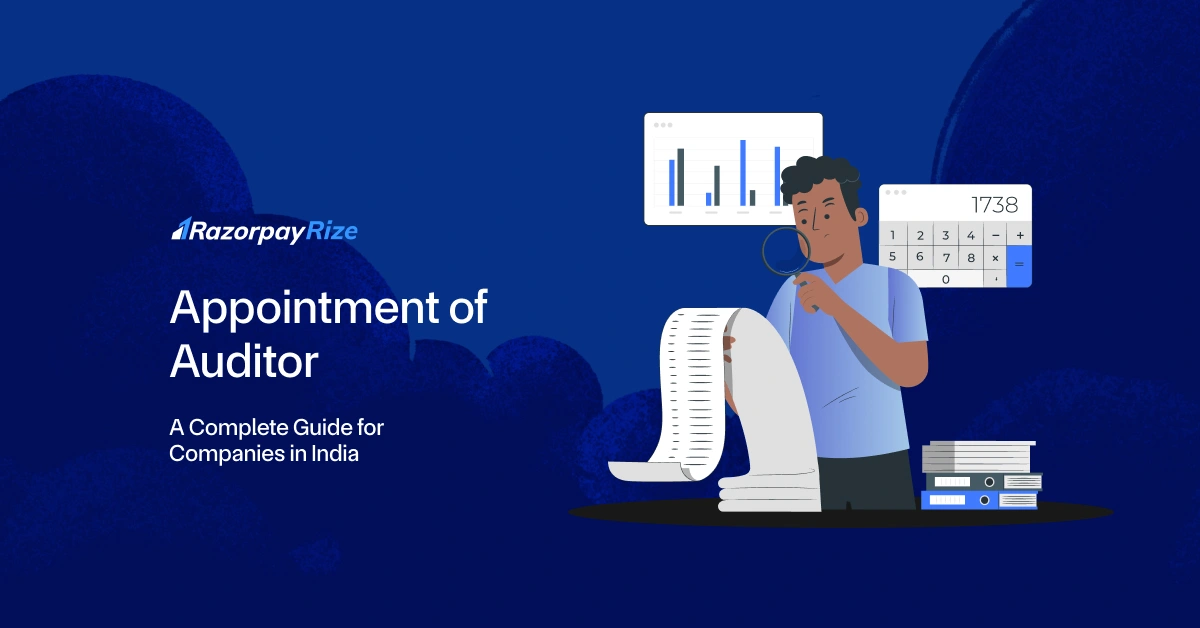Appointment of a director is a crucial step in establishing a Private Limited Company. A director oversees the company's operations and ensures compliance with legal requirements.
Additionally, directors play a vital role in protecting shareholder investments and steering the company towards success. In this article, we will delve into the process of appointing a director in a Private Limited Company, the eligibility criteria to be a director and the provisions of the Companies Act 2013 for the appointment of directors.
Table of Contents
Understanding the Role of a Director
Directors are individuals appointed by shareholders to supervise a company's activities, as guided by the Memorandum of Association (MOA) and Articles of Association (AOA). Since a company is a legal entity and cannot act independently, it functions through its directors. The Board of Directors, composed of these individuals, is responsible for the company's management and decision-making.
In a Private Limited Company, directors hold significant importance. They are tasked with making everyday decisions and overseeing the company's administration. Shareholders rely on directors to manage their investments effectively and ensure the company's growth and success.
Types of Directors of a Company
Directors are categorised into various types based on their roles and responsibilities. Let us take a closer look at each type:
Executive Directors
- Actively involved in the company's daily management.
- Often hold specific executive roles, such as CEO, CFO or COO.
- Responsible for implementing the company's strategies and policies.
Non-Executive Directors
- Do not participate in the company's day-to-day management.
- Provide independent oversight to the company's board and management.
- Offer valuable insights and advice based on their expertise and experience.
Independent Directors
- A subset of non-executive directors with no financial or other vested interests in the company apart from their role as directors.
- Primary responsibility is to safeguard the interests of the company's shareholders.
- Ensure transparency and accountability in the company's operations.
Nominee Directors
- Appointed by third-party authorities or the Government to tackle mismanagement and misconduct.
- Represent the interests of the appointing authority.
- Monitor the company's activities and report any irregularities.
Appointment of Director to Private Limited Company
Specific requirements must be met when appointing directors in a Private Limited Company, these are:
- The maximum directors in a private company is 15.
- The minimum directors in a private company is 2.
- The limit of 15 directors can be exceeded by appointing additional directors through a special resolution with the support of 75% or more shareholders.
- The appointment of directors must be in accordance with the provisions of the Companies Act 2013.
Provisions of the Companies Act, 2013
The Companies Act 2013 includes several key provisions related to the appointment and roles of directors:
- Section 149: Details mandatory requirements, such as having a certain number of directors, including a female director and a resident director.
- Section 152: Specifies the process for appointing directors at the company's general meeting and mandates the use of the Director Identification Number (DIN).
- Section 161: Provides guidelines for appointing additional, alternate and nominee directors by the Board.
- Section 164: Lists the disqualifications for becoming a director, ensuring that only eligible individuals are appointed to the board.
By adhering to these provisions, companies can establish a well-structured and compliant board of directors.
Reasons for Adding or Changing Directors in a Company
There are several reasons why a company may choose to appoint new directors/board of directors or change its existing board composition:
- Introducing New Talent: As a company grows, it may become necessary to bring new talent to the board to address new challenges and requirements that come with expansion.
- Preventing Ownership Dilution: By appointing additional directors, shareholders can delegate more operational responsibilities without relinquishing strategic control.
- Addressing Inefficiency of Current Directors: A company may appoint new directors to maintain efficiency if existing directors are underperforming due to personal issues.
- Complying with Statutory Requirements: Companies must maintain a specific number of directors according to the Companies Act 2013. They must promptly appoint new directors to comply with legal requirements if the number falls below the minimum.
Eligibility to Be A Director in a Company
To be eligible for appointment as a director, an individual must meet the following criteria:
- Be at least 18 years old, as minors are not permitted to hold the director position.
- Not be disqualified under the provisions of the Company Act 2013, which include:
- Being an undischarged insolvent
- Having been convicted of an offence involving moral turpitude
- Having been convicted of an offence under the Companies Act 2013
- Having been disqualified by an order of a court or tribunal
- Have mutual consent from the Board of Directors, shareholders and the individual being considered for the directorship.
It is crucial to ensure that the prospective director meets these eligibility criteria before proceeding with the appointment process.
Documents for Director Appointment
When appointing a director, the following documents are required:
- PAN card
- Identity proof (Voter ID, driver's license, Aadhaar card, etc.)
- Residence proof (utility bills, rental agreement, etc.)
- Recent passport-sized photograph
- Digital Signature Certificate (DSC)
Procedure for Appointing/Add a Director to a Company
The process of appointing a director involves several key steps:
- Reviewing the Articles of Association (AOA)
The first step is to review the company's Articles of Association (AOA) to ensure that it includes a clause permitting the appointment or addition of directors. If the current AOA lacks such a provision, it should be amended to include one before proceeding with the director's appointment.
- Conducting a General Meeting for Director Appointment
The company must formally appoint a director by passing a resolution in a general meeting, either during an Annual General Meeting (AGM) or an Extraordinary General Meeting (EGM).
To arrange an EGM, the company must conduct a board meeting to pass a resolution for holding the EGM. The resolution to appoint the director must be filed in Form MGT-14 with the Registrar of Companies within 30 days.
- Applying for Director Identification Number (DIN) & Digital Signature Certificate (DSC)
The individual selected for directorship must apply for a Digital Signature Certificate (DSC) and a Director Identification Number (DIN) if they do not already possess these. After obtaining the DIN, the prospective director must provide the company with their DIN along with a declaration affirming that they are not disqualified from being a director.
- Obtaining Consent from the Prospective Director – Form DIR-2
The individual proposed for directorship must express their consent to serve in this role by submitting Form DIR-2, a formal consent to act as a director. An individual can only be appointed as a company director by explicitly giving their consent. This step is crucial to ensure that the prospective director is willing to take on the responsibilities associated with the position.
- Issuing a Letter of Appointment to the Director
After obtaining consent from the prospective director, the company should issue a formal Letter of Appointment. This director appointment should detail the terms and conditions of the appointment, including the director's roles, responsibilities and any remuneration or salary. The Letter of Appointment serves as a legal document that outlines the expectations and obligations of both the company and the director.
- Filing Forms DIR-2 and DIR-12 with the ROC
Once the resolution for the appointment of a director is passed and the individual has submitted Form DIR-2, the company can officially appoint them as a director.
The company must file both Form DIR-2 and Form DIR-12 (detailing the particulars of the director's appointment) with the Registrar of Companies (ROC) within 30 days of the director's appointment. Failing to file these forms within the prescribed time frame can result in penalties and legal complications.
- Filing Amendment Applications with GST and Tax Authorities
After appointing a new director, the company must file the necessary applications to update the director's details with various regulatory authorities, including the GST Network (GSTN) and other relevant certificates, to reflect the change in directorship. This step ensures that the company remains compliant with all legal and regulatory requirements related to its directors.
Frequently Asked Questions:
Private Limited Company
(Pvt. Ltd.)
- Service-based businesses
- Businesses looking to issue shares
- Businesses seeking investment through equity-based funding
Limited Liability Partnership
(LLP)
- Professional services
- Firms seeking any capital contribution from Partners
- Firms sharing resources with limited liability
One Person Company
(OPC)
- Freelancers, Small-scale businesses
- Businesses looking for minimal compliance
- Businesses looking for single-ownership
Private Limited Company
(Pvt. Ltd.)
- Service-based businesses
- Businesses looking to issue shares
- Businesses seeking investment through equity-based funding
One Person Company
(OPC)
- Freelancers, Small-scale businesses
- Businesses looking for minimal compliance
- Businesses looking for single-ownership
Private Limited Company
(Pvt. Ltd.)
- Service-based businesses
- Businesses looking to issue shares
- Businesses seeking investment through equity-based funding
Limited Liability Partnership
(LLP)
- Professional services
- Firms seeking any capital contribution from Partners
- Firms sharing resources with limited liability
Frequently Asked Questions
How to appoint a director in a company?
To appoint a director in a company, follow these steps:
- Review the Articles of Association (AOA) to ensure it allows for the appointment of new directors.
- Conduct a general meeting (AGM or EGM) to pass a resolution for the director's appointment.
- Ensure the prospective director applies for a Director Identification Number (DIN) and Digital Signature Certificate (DSC).
- Obtain consent from the prospective director through Form DIR-2.
- Issue a Letter of Appointment to the director.
- File Forms DIR-2 and DIR-12 with the Registrar of Companies (ROC) within 30 days of the appointment.
- Update the director's details with relevant regulatory authorities, such as the GST Network (GSTN).
What are the criteria for the appointment of a director?
The criteria for the appointment of a director include:
- Being at least 18 years old.
- Not being disqualified under the provisions of the Company Act, 2013.
- Having mutual consent from the Board of Directors, shareholders and the individual being considered for the directorship.
Possessing a valid Director Identification Number (DIN) and Digital Signature Certificate (DSC).
How do you write a Director's appointment letter?
A Director's appointment letter should include the following details:
- The date of appointment
- The term of appointment (if applicable)
- The roles and responsibilities of the director
- Remuneration or salary details (if any)
- Expectations regarding attendance at board meetings and other company events.
- Confidentiality and non-disclosure clauses
- Termination conditions
What is the manner of appointment of Directors?
Directors are appointed through a formal resolution passed at a general meeting of the company (AGM or EGM). The appointment must be approved by the shareholders and comply with the provisions of the Companies Act, 2013. The appointed director must provide their consent through Form DIR-2 and possess a valid Director Identification Number (DIN) and Digital Signature Certificate (DSC).
How much does it cost to appoint a director?
The cost of appointing a director may vary depending on factors such as:
- Professional fees for legal and compliance services.
- Filing fees for Forms DIR-2 and DIR-12 with the Registrar of Companies (ROC).
- Charges for obtaining a Director Identification Number (DIN) and Digital Signature Certificate (DSC).
- Any remuneration or salary offered to the director.
It is advisable to consult with a legal professional or corporate service provider to determine the specific costs involved in appointing a director for your company.
How long does a director appointment take?
The timeline for a director appointment may vary depending on factors such as:
- The availability of the required documents and information.
- The time taken to conduct the general meeting and pass the appointment resolution.
- The processing time for obtaining a Director Identification Number (DIN) and Digital Signature Certificate (DSC).
- The efficiency of filing Forms DIR-2 and DIR-12 with the Registrar of Companies (ROC).
Typically, the entire process of appointing a director can take anywhere from a few days to a couple of weeks, subject to the company's diligence and compliance with legal requirements.
What documents are required for a director appointment?
The documents required for a director appointment include:
- PAN Card
- Identification Proof (Voter ID, Driving Licence, Aadhaar Card, etc.)
- Proof of Residence (utility bills, rental agreements, etc.)
- Passport Size Photograph
- Digital Signature Certificate (DSC)
- Consent to act as a director (Form DIR-2)
- Declaration of non-disqualification


















